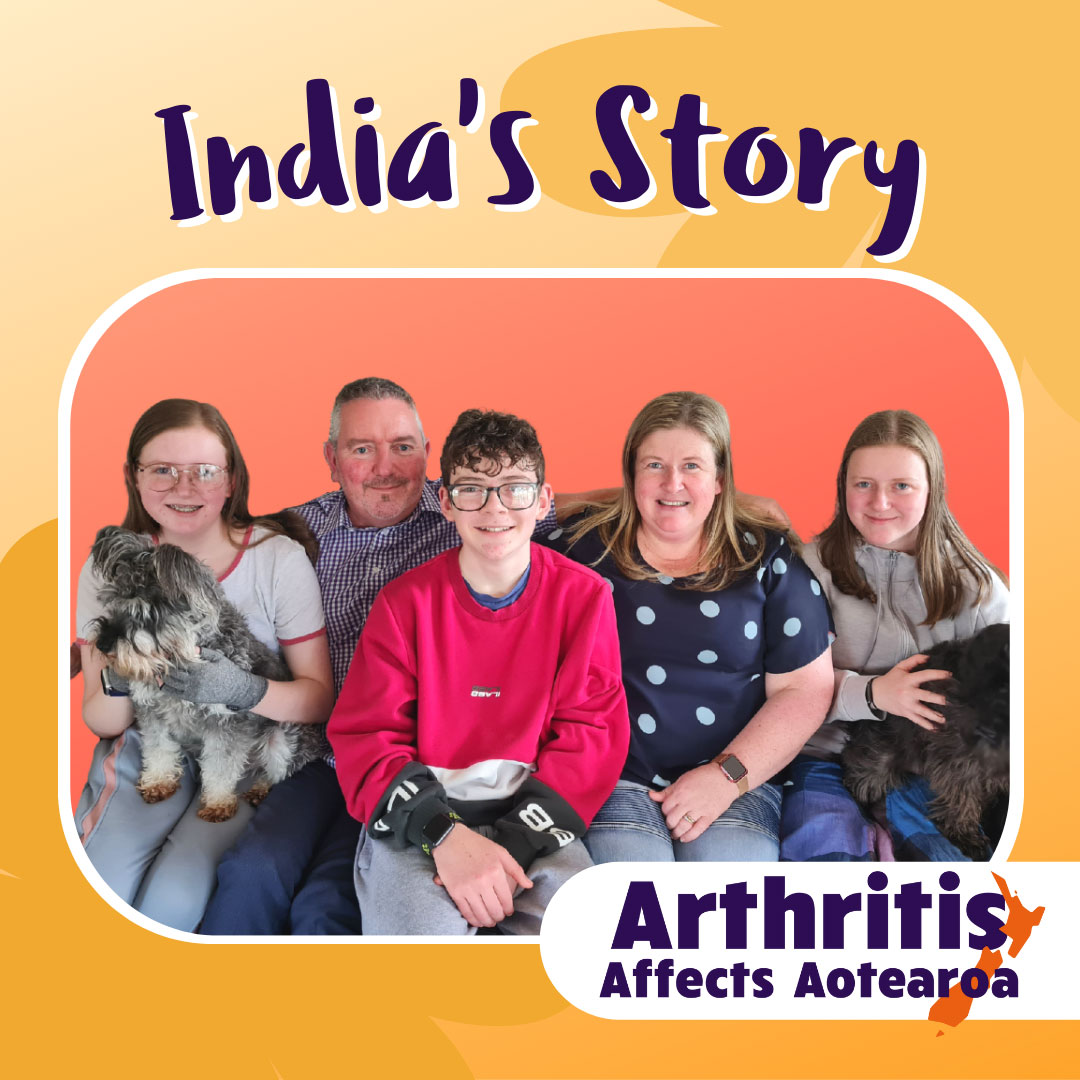It’s said that when you live with arthritis, your family lives with it too. They may not experience the pain and fatigue first-hand like you do, but it’s natural for them to struggle with the unwanted changes arthritis brings and grieve the things you’ve lost as a family.
“Arthritis to me has severely affected our family because it has limited us from doing the things we all love, and I feel like it has changed the way we live day-to-day,” says 14 -year-old Lachlan Heron.

Lachlan’s sister India, now 16, was 11 when the symptoms began and was later diagnosed with Juvenile Idiopathic Arthritis (JIA). During her last week of primary school, her right knee swelled up to three times the size of her left knee. The family knew something was wrong and; after an initial diagnosis at Rotorua Hospital, a visit to Starship confirmed India had JIA.
“It was quite stressful,” remembers Belinda, India’s mother. “It was stressful more because she and her twin sister were going to be starting a new school, and that was starting to look very different for India than what we had always thought it would be.”
“The hardest thing when India was diagnosed was the fact that you don’t want to see your child in pain,” says Fraser, India’s father. Finding the right balance with medication was particularly tough, he recalls. Initially, India received a methotrexate injection every Friday, which she’d be worried about from Wednesday.
“And by the time we got to Friday, she’d have whipped herself into a bit of a state and then Saturday and Sunday, she was just a write-off with the side effects,” says Fraser. “That was hard to see.”
The Heron family is extremely close, and India describes her parents and siblings as her support group. “They are always there for me in my highs and my lows.”
Living in the mountain biking capital of New Zealand, India and her sister Alicia often went cycling together, but Alicia has only ridden her bike once in five years. “We used to do a lot of biking together but – besides once during the last lockdown – I haven’t been biking since she was diagnosed.
“It had a bigger impact as it went on because we realised how big of a deal it was and that it was going to be a lifelong thing,” says Alicia. “I think having support for the siblings would have been good.”
Five years on, India and her family have learnt to live with arthritis. “I think now that she’s matured, and she’s older and understands it, she’s quite confident talking to medical people,” says Fraser. “She’s quite good at advocating for what she needs treatment-wise, and just the way she deals with everything has been impressive, but it was very hard at the start.”
And, as Lachlan suggests, there can be a silver lining. “I’d say it’s brought us together closer as a family just because we have to look after each other more.”
Having attended a few Arthritis New Zealand Childrens Camps, and then the Teens Camp, India saw the great work that we do for young people with arthritis. From raising awareness and organising events, to updated and trusted information and advice about arthritis, India wanted to get more involved, so joined the Youth Advisory Group.
The Youth Advisory Group is a way for young people with arthritis to stay connected and support each other. It serves as a platform for their voices to be heard, with the guidance of Arthritis New Zealand.
“They [India’s family] are always there for me in my highs and my lows.”
Learn More About Juvenile Idiopathic Arthritis (JIA)
Juvenile idiopathic arthritis (JIA) is the name given to a number of types of arthritis that occur in children.
JIA is an autoimmune condition. This means that the body’s immune system, which normally protects against infection, attacks healthy tissues by mistake, creating inflammation. The symptoms of JIA vary from person to person and can come and go from day to day and week to week. Symptoms will be worse during occasional ‘flares’; at other times the condition seems to disappear for a time.
Joints are sore and swollen because in JIA, the immune system attacks the synovium, the thin membrane that lines the joints and makes a fluid that helps them move smoothly. If inflammation is not treated, it can damage, joints, cartilage and bones and weaken muscles around the joint.